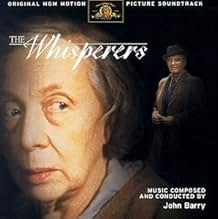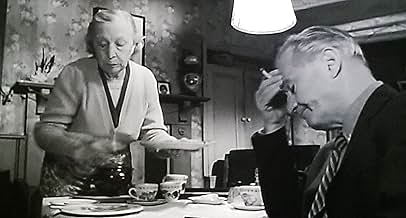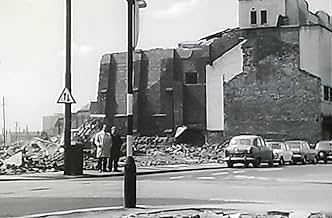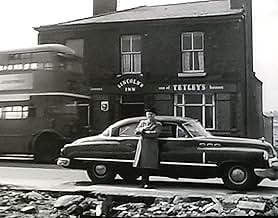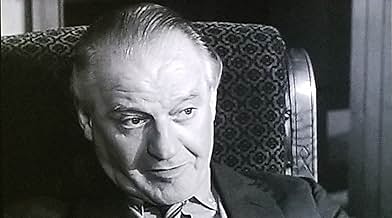IMDb RATING
7.1/10
1.6K
YOUR RATING
A lonely elderly Englishwoman talks to herself and hears voices talking about her.A lonely elderly Englishwoman talks to herself and hears voices talking about her.A lonely elderly Englishwoman talks to herself and hears voices talking about her.
- Nominated for 1 Oscar
- 9 wins & 4 nominations total
- Director
- Writers
- All cast & crew
- Production, box office & more at IMDbPro
Featured reviews
This may be the bleakest of all the 'kitchen sink' movies, (it is unremittingly gloomy) and Bryan Forbes' picture of the British Welfare State in the 1960's has an almost Dickensian feel to it. But then Forbes always seemed to work better with subjects which didn't lend themselves to levity.
It's the story of Mrs Ross, a pensioner living on her own and beset by the voices one hears when one is so lonely and in the part Edith Evans is quite magnificent. If you think Evans too patrician for the part of an old woman living in a working class district of an industrial, mostly derelict and rain-sodden city, she does point out that 'she married beneath her' and since she is hardly ever off the screen this is a real tour-de-force, (and she was nominated for the Oscar for it as well as winning a whole slew of other awards). There are also first-rate supporting performances from the wonderful Avis Bunnage and the always consistently reliable Gerald Sim and Eric Portman, terrific as her errand husband). Unfortunately the film's sub-plots involving stolen money and some gangsters seems superfluous and gives the film a somewhat melodramatic air and its down-beat mood meant it was never a popular success and it is hardly ever revived. But seek it out, all the same; it is certainly worth seeing.
It's the story of Mrs Ross, a pensioner living on her own and beset by the voices one hears when one is so lonely and in the part Edith Evans is quite magnificent. If you think Evans too patrician for the part of an old woman living in a working class district of an industrial, mostly derelict and rain-sodden city, she does point out that 'she married beneath her' and since she is hardly ever off the screen this is a real tour-de-force, (and she was nominated for the Oscar for it as well as winning a whole slew of other awards). There are also first-rate supporting performances from the wonderful Avis Bunnage and the always consistently reliable Gerald Sim and Eric Portman, terrific as her errand husband). Unfortunately the film's sub-plots involving stolen money and some gangsters seems superfluous and gives the film a somewhat melodramatic air and its down-beat mood meant it was never a popular success and it is hardly ever revived. But seek it out, all the same; it is certainly worth seeing.
This grim tale about the loneliness and vulnerability of old age, set in what must be the most rundown section of Manchester, manages to touch us in an unsentimental manner. Its chief quality is the crisply photographed slum in which it largely takes place, like the last remains of the 19th century surviving into the post-War 20th. The protagonist, Margaret Ross, played by the stately Edith Evans, lives in a cluttered ground floor flat in this urban wasteland of rain-slicked cobblestone streets without cars or pedestrians, but an abundance of crumbling brick walls, gutted buildings and stray cats. The opening credit sequence of grey rooftops under rainy skies is particularly striking.
At home she looks through newspapers, eats bread with honey, sips tea and listens to radio as her sink faucet drips, drips, drips. She constantly hears voices (the "whisperers" of the title) and turns up the radio to drown them out. When the upstairs neighbors, an interracial couple with an infant, pound on the floor in protest, she pounds back on the ceiling with a broomstick and is showered with bits of plaster. (We see the bald patch from where the plaster has fallen but the absence of other patches means that she has never before banged on the ceiling; this strand of the story would have been more convincing if more of the ceiling was similarly defaced.) When not talking to the imagined voices, she spends her solitary life visiting the library where she surreptitiously warms her feet on the heating pipes, collecting welfare from a local government office where she makes frequent references to her good breeding and high-class family connections, listening to sermons at a local evangelical storefront chapel, and tending to household chores which seem to consist mostly of emptying large quantities of dust, coal ashes and bottles and cans from which she derives most of her nourishment.
Evans brings dignity to the role but somehow she does not seem to be the right actress for the part. Margaret Ross is a woman of humble origins. Evans is a thoroughbred. True, she does claim that she married beneath herself, but that would be putting it mildly. Still, she has the acting skills to keep us entertained, and she gets brilliant support from the secondary players: Eric Portman as her surly husband, Avis Bunnage as a predatory welfare mom and Gerald Sim as a welfare clerk add a great deal to the overall presentation. Leonard Rossiter, too, shows up for a strong few minutes as a government official. And John Barry supplies a melancholy but unobtrusive musical score.
Evans got an Oscar nomination for this performance. Fair enough. But I think Gerry Turpin should have also gotten one for his beautiful cinematography.
At home she looks through newspapers, eats bread with honey, sips tea and listens to radio as her sink faucet drips, drips, drips. She constantly hears voices (the "whisperers" of the title) and turns up the radio to drown them out. When the upstairs neighbors, an interracial couple with an infant, pound on the floor in protest, she pounds back on the ceiling with a broomstick and is showered with bits of plaster. (We see the bald patch from where the plaster has fallen but the absence of other patches means that she has never before banged on the ceiling; this strand of the story would have been more convincing if more of the ceiling was similarly defaced.) When not talking to the imagined voices, she spends her solitary life visiting the library where she surreptitiously warms her feet on the heating pipes, collecting welfare from a local government office where she makes frequent references to her good breeding and high-class family connections, listening to sermons at a local evangelical storefront chapel, and tending to household chores which seem to consist mostly of emptying large quantities of dust, coal ashes and bottles and cans from which she derives most of her nourishment.
Evans brings dignity to the role but somehow she does not seem to be the right actress for the part. Margaret Ross is a woman of humble origins. Evans is a thoroughbred. True, she does claim that she married beneath herself, but that would be putting it mildly. Still, she has the acting skills to keep us entertained, and she gets brilliant support from the secondary players: Eric Portman as her surly husband, Avis Bunnage as a predatory welfare mom and Gerald Sim as a welfare clerk add a great deal to the overall presentation. Leonard Rossiter, too, shows up for a strong few minutes as a government official. And John Barry supplies a melancholy but unobtrusive musical score.
Evans got an Oscar nomination for this performance. Fair enough. But I think Gerry Turpin should have also gotten one for his beautiful cinematography.
Somerset Maugham once made this observation about poverty: "You will hear people say that poverty is the best spur to the artist. They have never felt the iron of it in their flesh. They do not know how mean it makes you. It exposes you to endless humiliation, it cuts your wings, it eats into your soul like a cancer."
The spirit of what he said pervades this disturbing film. No doubt this work would have to resonate more in Britain, but even 50-years later, unemployment, abandonment of the elderly, and welfare subsistence are fairly universal maladies of the Western World.
"The Whisperers" is not a comfortable experience. A disturbed old woman, Mrs Ross (Edith Evans), who lives alone is slowly losing her grip on reality, she lives in impoverished circumstances and is dependent on welfare. When she accidentally comes into a little money, she is preyed on like a wounded animal in the jungle. Even her son, Charlie (Ronald Fraser), and her estranged husband, Archie (Eric Portman), take advantage of her.
This is more than a performance by Edith Evans; when it's over, you believe Mrs Ross existed.
She lives in a society where ruthless opportunists abound. However, the story is not devoid of decent people; her young neighbour and especially the understanding Mr Conrad (Gerald Sim) at the welfare office redeem what would be a very jaundiced look at modern life.
Bryan Forbes was a man of many talents: actor, writer and director, but this film would have to be at the pinnacle of his achievements. The film boasts brilliant photography and real locations. You can almost smell the rising damp and cheap tobacco, and feel the mud spattered on your shoes - not to mention the edge of the cut-throat razors in one disturbing scene; powerful imagery in the impressive tradition of British 'kitchen sink dramas'.
The film has a score by John Barry. Although I didn't see this film until 50 years after it was made, I knew the theme far earlier from a Barry compilation album, and always wanted to see the film it went with. This was before Barry settled into that languid style when many of his scores seemed interchangeable. During the 60's and 70's he was one of the most experimental composers. He used a harpsichord here in a small-scale work, which suited the poignancy and bleakness of the story.
Although dramatised, the film shows a slice of modern life, but from a rather dispassionate point-of-view and that makes it hit home all the more.
The spirit of what he said pervades this disturbing film. No doubt this work would have to resonate more in Britain, but even 50-years later, unemployment, abandonment of the elderly, and welfare subsistence are fairly universal maladies of the Western World.
"The Whisperers" is not a comfortable experience. A disturbed old woman, Mrs Ross (Edith Evans), who lives alone is slowly losing her grip on reality, she lives in impoverished circumstances and is dependent on welfare. When she accidentally comes into a little money, she is preyed on like a wounded animal in the jungle. Even her son, Charlie (Ronald Fraser), and her estranged husband, Archie (Eric Portman), take advantage of her.
This is more than a performance by Edith Evans; when it's over, you believe Mrs Ross existed.
She lives in a society where ruthless opportunists abound. However, the story is not devoid of decent people; her young neighbour and especially the understanding Mr Conrad (Gerald Sim) at the welfare office redeem what would be a very jaundiced look at modern life.
Bryan Forbes was a man of many talents: actor, writer and director, but this film would have to be at the pinnacle of his achievements. The film boasts brilliant photography and real locations. You can almost smell the rising damp and cheap tobacco, and feel the mud spattered on your shoes - not to mention the edge of the cut-throat razors in one disturbing scene; powerful imagery in the impressive tradition of British 'kitchen sink dramas'.
The film has a score by John Barry. Although I didn't see this film until 50 years after it was made, I knew the theme far earlier from a Barry compilation album, and always wanted to see the film it went with. This was before Barry settled into that languid style when many of his scores seemed interchangeable. During the 60's and 70's he was one of the most experimental composers. He used a harpsichord here in a small-scale work, which suited the poignancy and bleakness of the story.
Although dramatised, the film shows a slice of modern life, but from a rather dispassionate point-of-view and that makes it hit home all the more.
The supremely versatile film-maker, Bryan Forbes directs a remarkably bleak and eerily unsettling treatise on the multifarious cruelties inherent with old age. 'The Whisperers' (1967) remains a forceful, extraordinarily persuasive work of melancholic cinema that has lost none of its considerable power to enthral and perturb with equally forceful cinematic rigour! It would be greatly remiss of me if I failed to praise maestro, John Barry's truly magnificent score!
No small admirer of, Brian Forbes's dazzlingly ecclectic cinema, I passionately believe that 'The Whisperers' remains one of his finest films. Exquisitely shot, with exemplary performances, the magisterial, Edith Evans on positively mesmeric form, movingly delivering one of cinema's most genuinely affecting performances. It is tantamount to a cultural travesty that this monochrome masterpiece has long been allowed to mildew away in undeserved obscurity. 'The Whisperers', along with the equally unsettling existential nightmare 'Séance on a Wet Afternoon' are arguably two of the more compelling dramas produced during the UK's dynamic Renaissance of the 1960s. Hopefully some tasteful, forward-thinking celluloid archivist might soon release this exceptionally fine film on a restored, features-packed Blu-ray!
No small admirer of, Brian Forbes's dazzlingly ecclectic cinema, I passionately believe that 'The Whisperers' remains one of his finest films. Exquisitely shot, with exemplary performances, the magisterial, Edith Evans on positively mesmeric form, movingly delivering one of cinema's most genuinely affecting performances. It is tantamount to a cultural travesty that this monochrome masterpiece has long been allowed to mildew away in undeserved obscurity. 'The Whisperers', along with the equally unsettling existential nightmare 'Séance on a Wet Afternoon' are arguably two of the more compelling dramas produced during the UK's dynamic Renaissance of the 1960s. Hopefully some tasteful, forward-thinking celluloid archivist might soon release this exceptionally fine film on a restored, features-packed Blu-ray!
Dame Edith Evans is a knockout playing Mrs. Ross, a lone old woman who not only hears whispering but believes it to be voices talking to her from inside her radio, and not the broadcast. She believes the voices to be hostile. We therefore see that she is losing grip as time wears on and she lives her solitary life. This movie is great, strong and sad. Turns out the reason she's on her own is that both her husband and her son are rats. One gets imprisoned and one is a drunk living in an SRO. It's her son who's imprisoned but not before he leaves a stash of cash in her hoarder-house. Well. We've all certainly seen enough movies to know that cash can only bring trouble, which it does in the form of Avis Bunnage, who delivers another power performance as the ne'er-do-well who finds Mrs. Ross and takes her home. Alas, the treatment of this woman who is well and truly alone will break your heart.
Did you know
- TriviaThe director Bryan Forbes and Nanette Newman, who played the upstairs neighbor, were husband and wife.
- GoofsThe old kitchen curtain is shown in scene after Archie leaves, while Margaret is moping around the apartment. The new curtains are shown again after she returns from seeing Mr. Conrad at the National Assistance Board.
- Quotes
Archie Ross: What kind of job might it be, sir?
Mr. Conrad: Doorman at a cinema.
Archie Ross: Oh, wonderful. Nice and healthy and in the open.
Mr. Conrad: The healthiest jobs, Mr. Ross, are the ones you keep.
- ConnectionsVersion of ITV Play of the Week: The Whisperers (1961)
- SoundtracksShall We Gather at the River?
(uncredited)
Written by Robert Lowry
Performed by Edith Evans and mission attendees
- How long is The Whisperers?Powered by Alexa
Details
- Runtime
- 1h 46m(106 min)
- Color
- Sound mix
- Aspect ratio
- 1.66 : 1
Contribute to this page
Suggest an edit or add missing content


